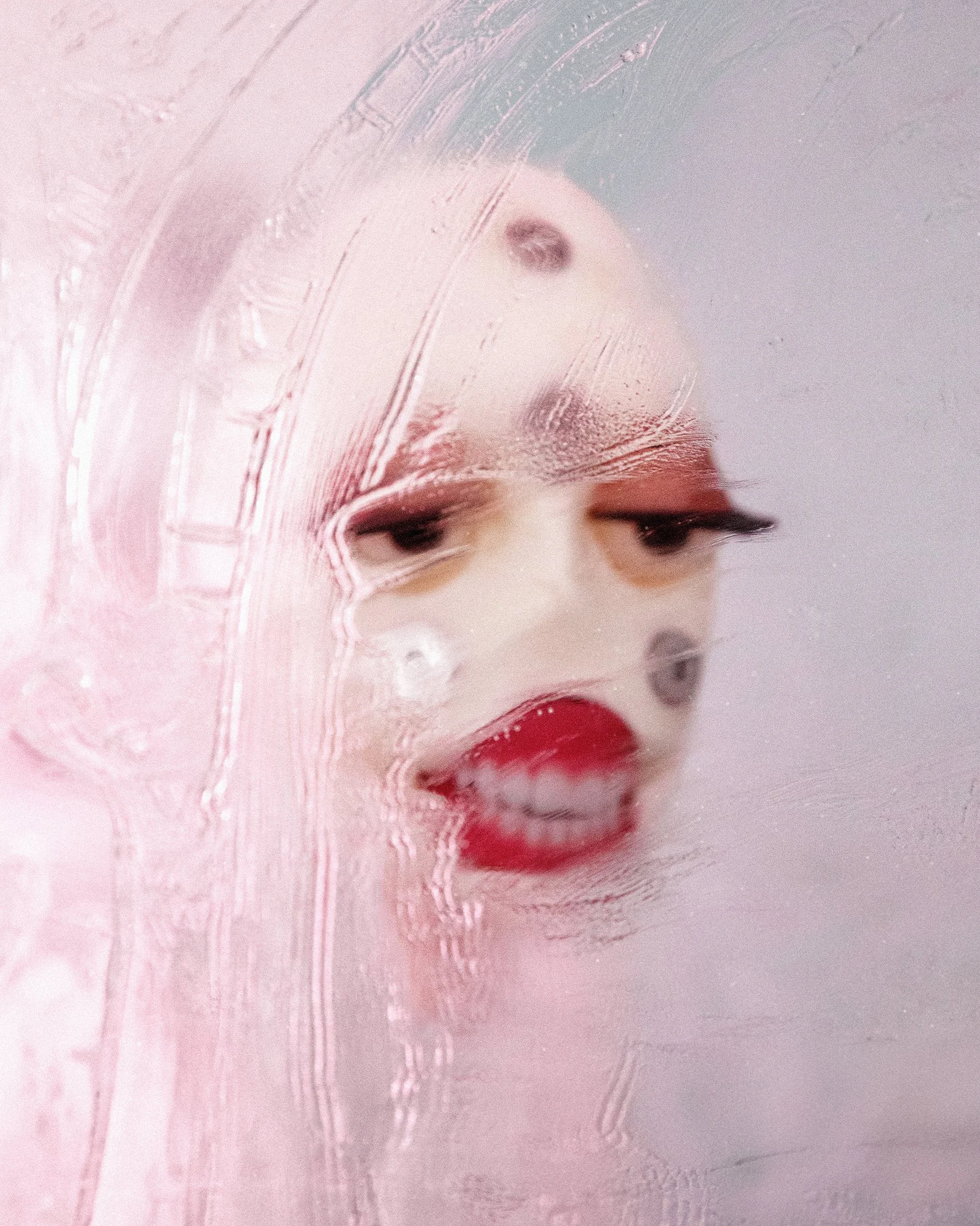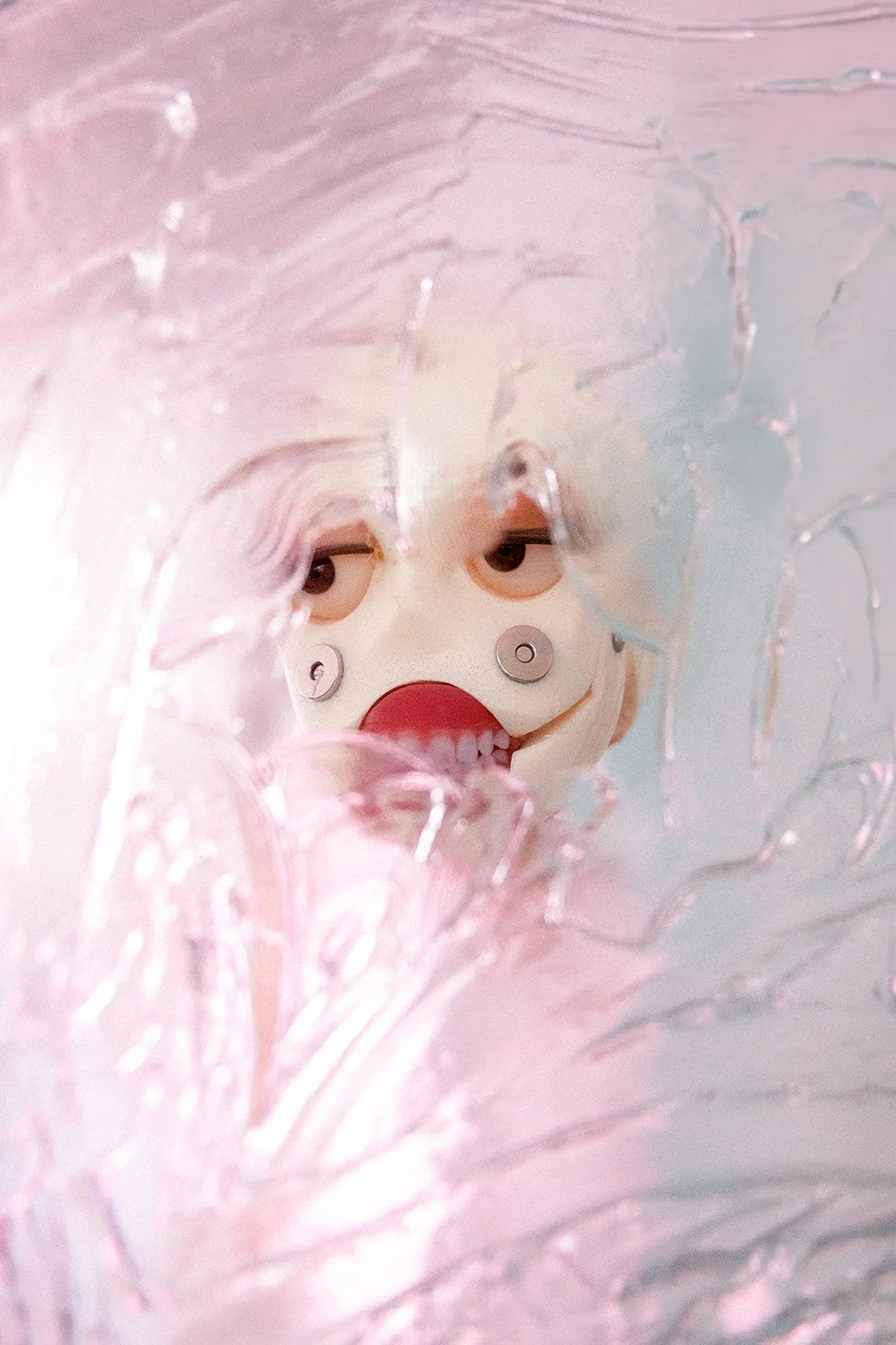Juno Calypso on Body Horror, Catharsis and Self-Portraiture
Words: Lauren O’Neill
Make it stand out
Over the past decade, Juno Calypso’s photography has become synonymous with the uncanniness involved in feminine self-regard: the inherent strangeness of invasive and painful beauty treatments, despite their normalisation; the way in which despite all our adornments, feminine-coded people still look in the mirror and frequently see monstrousness.
Calypso's work has explored these themes again and again – her photography, which includes self-portraiture, is formally deliberate and enticing – the pinks and pastels invite you in – but ultimately odd; just a little bit off. Her imagery wordlessly pokes at the place where beauty becomes weird. As such, her photography was the perfect choice for the cover of Emma Glass' new novel Mrs Jekyll, a gender-flipped, present-day reimagining of the gothic novel Dr. Jekyll and Mr. Hyde, centring on a woman with a terminal illness, as she reckons with a new perspective on the demands of womanhood, and the rageful but resolutely feminine force that is newly stirring within her. The cover depicts a woman's face looking into a magnetised mirror, riffing on the book's themes of self-perception and the interior versus the exterior.
To find out more about Mrs. Jekyll and its connections with Calypso's work, we caught up with the artist to chat about the similarities between photographic and literary introspection, what sports documentaries can tell us about art, and what “bad taste” means to her in 2024.
Book covers are a very specific art form because they have to express something abstract but enticing. Did you select a piece you'd already made for this book cover?
It was a piece that already existed but originally we were going to go with a different image that I had. I'm quite glad we didn't go with that though, because it's quite similar to another book that is out at the moment, where there's a silhouette in the door. That seemed like the obvious approach because it was ambiguous, and didn't say too much. Just spooky enough. But then half way through the process, I made a new body of work, and that was responding to a show I was doing at the Wellcome Collection, The Cult of Beauty. So I did a couple of pieces that were about dysmorphia and ugliness and feeling disgusting, and then when the publishers saw that image, they were like "That's exactly what we need for the book." But I almost thought it was too obvious!
What was it about that image that resonated with the themes of the book for you?
It's very medical – there's a hospital aspect to it, there's a woman and there's a horrifying face in the mirror – it just completely ties into the book's body horror.
Did you feel like the book was a particular mirror up to the themes in your work? How did you personally relate to it?
There's the big overall theme – the relationship you have with yourself and your body. Your view of yourself. Hallucinations and delusions and your mind playing tricks on you. So that's what that work was about – a simple image, looking in the mirror and seeing a monster staring back at you. Everyone can relate to that kind of thing but it feels very personal and real. But there were other little things that came into it too. For instance when I was making this work I was listening to The Prodigy a lot, getting back into old music from my childhood. And I was thinking about the album covers that were very kind of, saturated and there was something really acrid and disgusting about that kind of design. And when I finished the book, I was thinking, "This reminds me of that Prodigy video, for "Smack My Bitch Up" where it's like, there's a crazy thing going on and then the twist at the end is like, 'Oh it's a woman doing all these violent things'". So it felt like maybe that was another theme that came through. Monstrer woman!
A lot of your work in general focuses on introspection and the way we think about ourselves, and the way that then manifests in how we present to others. And that's quite similar to how a character in a first person novel also expresses. Did you find that those things married, and was it interesting for you to create a book cover as a result?
It was. It makes me quite jealous, because I think, "I should really learn to write." It's that cathartic thing where you're just saying what you're thinking in your mind. It was really nice to have my work, if not with my own words inside, then words that I agree with and resonate with.
Books are a commercial object. When you were liaising with the publisher did you find that there were any motifs, colours, or fonts that were popular and that they wanted to encourage?
You know when something works because it just works. The second image, the one they finally went with, whatever they did to it design-wise, I was happy with all of it, but with the original image that we scrapped, nothing was working but we couldn't pinpoint why. This one, it felt like we couldn't go wrong.
Obviously, design-wise, it feels like millennial pink is still really popular too.
Pink is there for life. We can't change pink. But we have to move away from the Oliver Bonas pink. Doing stuff like this is to distinguish from Oliver Bonas pink. He wouldn't use this one. It's not cute enough. Millennial pink but "ugh, off key."
What's the next pink. Neon, hot? Who is she?
It depends what it's going alongside. Where is the pink existing? I quite like a musty, dusty, gross pink.
What themes are you working with at the moment otherwise?
It's been good to do this because I'm at a bit of a crossroads with my own work. Doing things like this, it helps.
How do you find you're working at the moment in terms of trying to get to the next place with what you're making?
I'm trying to let go of my grip on the past and what I've done before, and try something new. I've started painting, doing watercolours, doing anything that feels enjoyable. Trying to get back into that flow state, and the time is flying. So I've been painting and I'm enjoying it!
Are there any go-to pieces of media that you return to when you need to be inspired?
I've been researching other artists' careers. There's a really great book called "Tell Them I Said No" [by Martin Herbert] which is a short book of essays about artists who have disappeared or destroyed all their work or done really radical things with their careers, and that's been good. I like watching sports documentaries. I feel like sportspeople have really interesting careers. What we all struggle with, they have it bottled – the focus and the training and the sacrifice, and if it goes wrong, there's nothing they can do. I like the Michael Jordan documentary, where he's the best at basketball, and he gets so bored at being the best that he does baseball, which was his true dream as a child, and he's rubbish, he's terrible. But he's like, "I have to do what makes me happy."
Finally, at Polyester we have a motto which is "Have Faith in Your Own Bad Taste." And bad taste is such an interesting concept because it's so classed, it's so much about gender. Everything about culture feels contained in "bad taste". Could you talk a bit about what bad taste means to you?
We're in an interesting time. There's less and less of what is considered bad taste, and everyone is like, "I like highbrow and lowbrow" and it's like "That isn’t particularly interesting or unique anymore.” Everyone is watching reality TV now, everyone is indulging in "bad taste". There kind of isn't really "bad taste" in that way anymore. These days if you really wanted to be "bad taste" you'd tell people you read the Daily Mail. All the things I would normally say, I just don't think they're particularly radical anymore. Bad taste in politics would be one. Or just bad taste with where you go on the internet. I've been really compelled by all these gossipy, toxic, weird places where venom is just spilling out of people. It's so fascinating just to see how much poison is in people's minds. I'll be on these message boards where people are vile and crazy, and some of the comments are fantastic. It's like, "That needs to be put in a little poem because that is just a hate-filled sentence from Linda in Shropshire." She's writing poetry with her venom. It's so banal, it's so suburban. I love it. I'm talking TattleLife, obviously, as I'm sure you can tell. That's what would qualify as bad taste. I don't write anything, but I lurk.
Mrs Jekyll by Emma Glass published by CHEERIO is available now at all good retailers.




